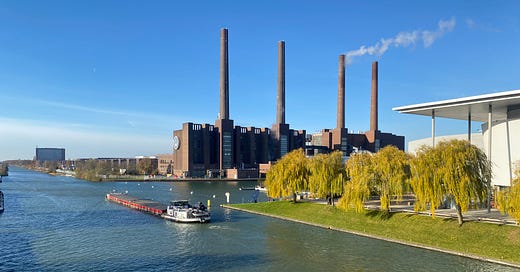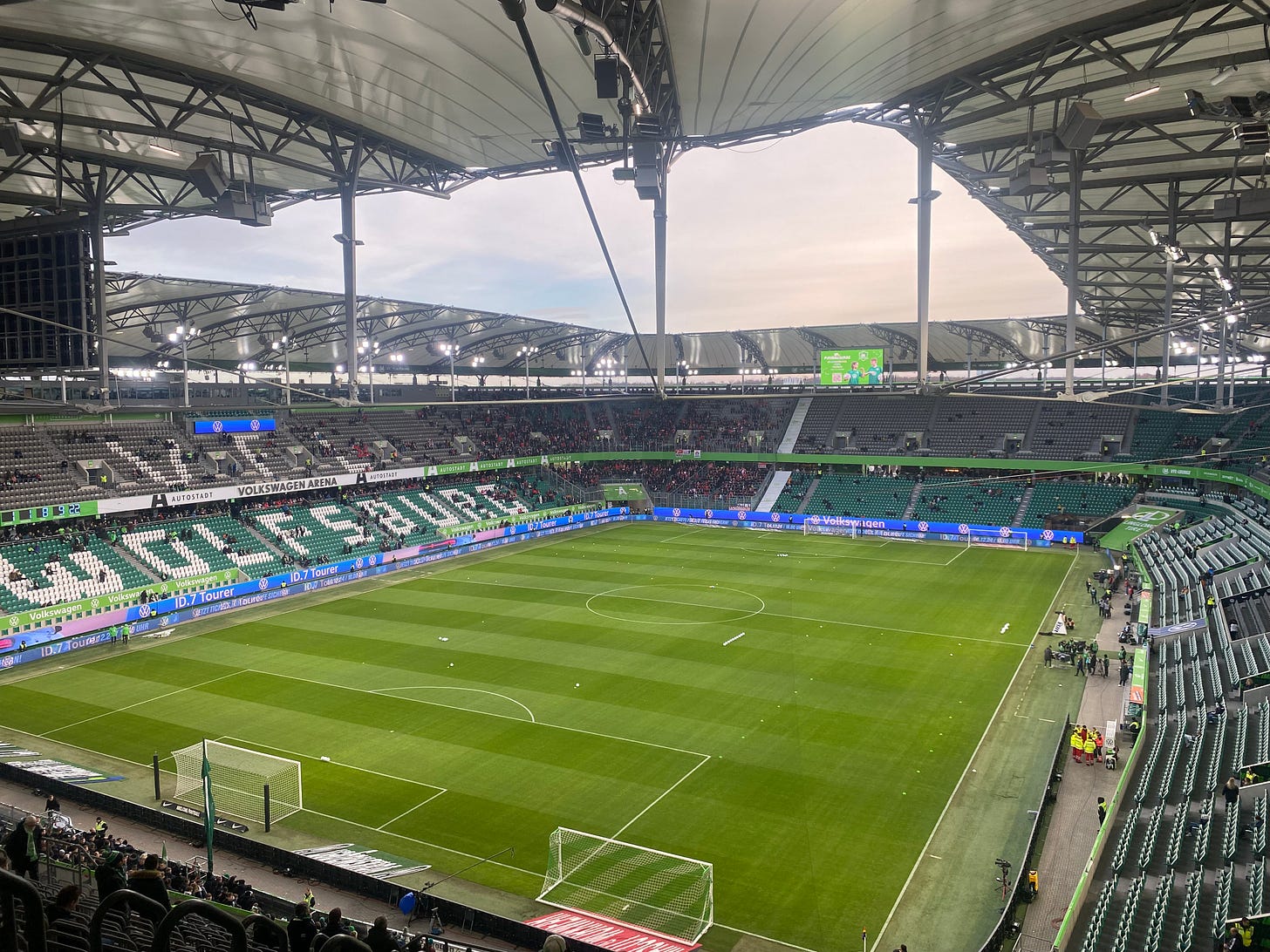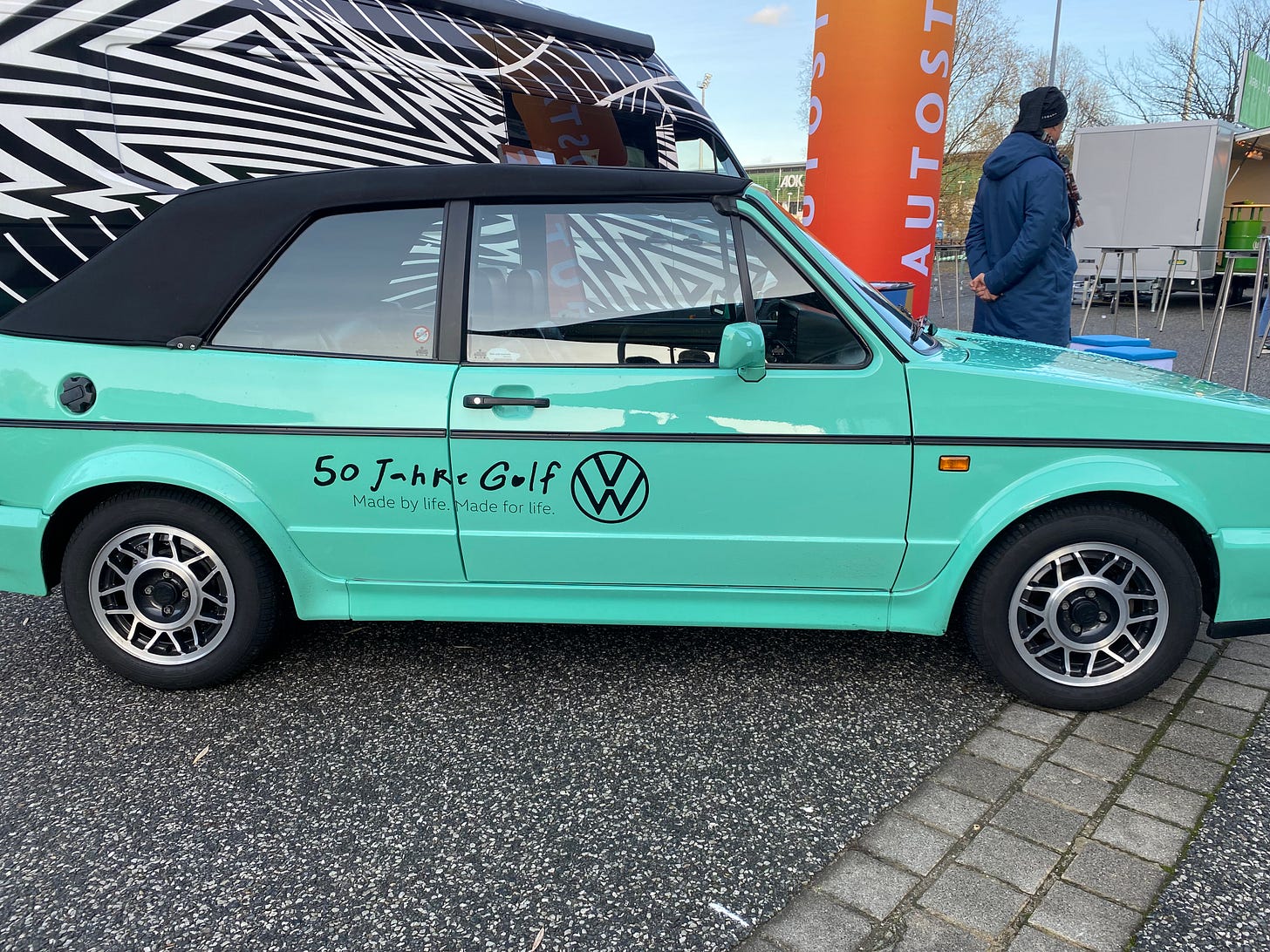Wolfsburg (A)
A trip into the heart of Germany’s automotive industry and its crumbling economy
“So, where are we going?”
“Car museum, I guess?”
I suddenly feel a pang of guilt. I’d dragged my mate Dan, who’d flown over to see me for the weekend, to Wolfsburg. Here we were, two men in our early thirties, both with no driving license, in a city that solely exists to serve the German automotive industry.
The day would only get worse from there. Not only were we not interested in the city’s only export, we'd have to suffer through a torrid game of football in the freezing cold and then were delayed by almost 45 minutes on our way home. Surrounded by drunken Union Berlin fans, many of whom had completely lost the run of themselves while both of us were completely sober, I was worried I’d sacrificed 15 years of friendship for some middling newsletter content.
“Are you going to write about this one?” Dan asked me.
While I’d rather forget the day had ever happened, there certainly was something to write about. Just a few weeks earlier Volkswagen Group announced it would be closing at least three of its plants in Germany, and that staff redundancies would be made to cut pay by 10% across the total workforce. The automotive giant, which holds other prestigious brands such as Audi and Porsche under its umbrella, employs almost 300,000 across the country.
Situated in Lower Saxony, the city of Wolfsburg is named for the castle, originally mentioned in a document dated 1302. In July 1938, plans for a city centred around the village of Fallerlsben were announced. Known as Stadt des KdF-Wagens bei Fallersleben, ("City of the Strength Through Joy” car at Fallersleben) the new conurbation would house workers of the newly built Volkswagen factories. These workers would assemble the model which later became known as the VW Beetle.
During the Second World War, military cars, aeroplanes and equipment would be built in these factories. When American troops took control of the city in April 1945, 7,700 forced labourers were liberated.
As West Germany went through its rapid recovery of the 50s and 60s, driven in no small part by the success of its automotive industry, Wolfsburg’s population grew exponentially. By 1973, more than 130,000 people lived in the city and its area grew from 35 to 204 km2 as nearby villages were subsumed under a land reform act. With the demand for German cars never seeming to die, the city thrived for the next few decades. According to stats published in DW, more than 60,000 people living in Wolfsburg work for VW. The average VW workers’ wage of €62ph made the city a desirable place to live. As recently as 2017, Lower Saxony’s industrial power, strong trade unions and political consensus led to The Economist calling the city a ‘Social Democratic Utopia’.
But that isn’t how it felt. Maybe it’s our collective lack of interest in bumpers and carburetors, but Wolfsburg felt like a town very much down on its luck. I’ve seen them before. I’ve lived on the south coast of the UK, where once thriving seaside towns have been ravaged by affordable international holidays and malicious land grabs. You hear the horror stories of the degradation of once proud single industry towns which suddenly have no answer once that industry starts to fall apart. What happens when the steelworks close in Port Talbot? How do towns like Merthyr Tydfil survive when the mines shut down?
That’s not to say Wolfsburg sees anything like the levels of poverty of those places. Germany’s economy is still outperforming the UK’s comfortably, but to ignore the warning signs in a town such as this would be foolhardy. German cars, once feted for their exacting standard of engineering and high performance, aren’t that desirable anymore. The entire native industry has been outflanked by the marketing and software prowess of electronic vehicle manufacturers in the US and China. It serves as a microcosm for Germany’s — and much of Europe’s — economy. Staid, pre-digital and weighed down by an idea of its former glory.
Editor’s note: I’d recommend Yanis Vourafakis’ brilliant Technofuedalism: What Killed Capitalism to further understand how Europe is falling behind on vital digital infrastructure.
That decline facilitates genuine and profound questions about the future viability of this town. DW’s piece shares the insight of Kristin Rößer, a real estate agent. She says VW workers are calling to “sell their houses before their values collapse.”
Inevitably, that type of fear bleeds into the businesses that support the workers. Walking around the city we find it hard to find a place to get a cup of coffee before the game, or somewhere to get a drink once the match is over. Apart from a glittering designer outlet nestled along the canal, the promenades of shops feel shabby and under-developed. Many businesses have closed or are sparsely populated. Worrying for a Saturday afternoon on game day.
We decide on getting to the stadium early. Due to my poor organisation, we’d be sitting with the home fans rather than the travelling Unioner. As we approach the stadium, it seems we could have easily worn the club colours even without an official guest ticket. We spot far more red and white than lime green on the short walk to the Volkswagen Arena.
Outside the ground, we tuck into a bratwurst each (€4.20), some pommes to share (€4.20) and an alcohol-free Becks (€6 but also complete pish). We settled in our seats about an hour before kickoff, a stupid decision given the dropping temperatures.
If you were a VW worker trying to escape work for 90 minutes, there is no chance for respite. The company’s logo is everywhere around the stadium which also takes its name. The club is one of few exceptions to Germany’s 50+1 rule. Originally founded in 1945 by the workers at the VW factory, the club has been bankrolled by the company since its inception. Until 1999, the club had bounced between the second and third tiers. However, since earning promotion to the Bundesliga, they have never been relegated, winning the league in 2009 and the DFB-Pokal in 2015.
As kickoff arrives, the stands start to fill up, but there are still large pockets of empty seats around the stadium. The travelling support is spilling out of its official allocation and into the home seats.
The energy picks up somewhat as the teams enter, a slightly ostentatious light show doing little to intimidate the travelling support. The Nordkurve Ultras do their best to whip up an atmosphere, but they gain little support from the fans in the more expensive sideline seats.
The first half is truly dire. Union are content to sit back and soak up pressure from Wolfsburg, who provide little threat to the visitors goal. When Union do take possession, they lose it instantly as the out ball into Jordan Siebatcheu consistently bounces back into a congested midfield. It’s a desperate half of football, one that furthers my feeling of guilt for subjecting one of my best mates to this poorly conceived outing.
The second half provides some entertainment. Union brought on the energetic and purposeful Tom Rothe at left wing-back. Benedict Hollerbach also joins the action on the left of an attacking three, providing impetus through some darting runs both on and off the ball.
Union’s newly found purpose sparks a response from the home team too. Rather than retaining possession aimlessly, Wolfsburg sense an opportunity to exploit gaps in the opposition’s suddenly fluid 3-4-3 formation. For all the added space you still feel one goal will win it. After all, Union have scored the second fewest and conceded the second fewest goals in the league this season.
In the 71st minute, Wolfsburg captain Max Arnold slid a darting pass into Union’s box. A little flick around the corner causes further havoc. The ball isn’t properly cleared from the ensuing square pass across the face of the goal, allowing Ridle Baku to break onto the bouncing ball. The German winger just about organises his feet, drilling a shot into the ground and past Frederik Ronnow. Sustained pressure from Union in the final minutes is wasted by profligate dead ball deliveries and snatched chances in front of goal. The game ends 1-0 to the hosts.
Dan and I spend the next hour or so in an Irish bar. Just as we’re regaining feeling in our extremities, we’re back in the cold, waiting almost 45 minutes for our delayed hour-long train back to the Haupstadt. Some of the Unioner on the platform are in dire straits. One lad is so pissed he almost wobbles into the path of an oncoming bullet train, another is balled up on the floor in floods of tears.
On the train home, Dan tells me the sheer misery of the day made it perversely enjoyable. If that isn’t an advertisement for German football, I don’t know what is.








A newsletter I didn't know I needed.
A newsletter I didn't know I needed.